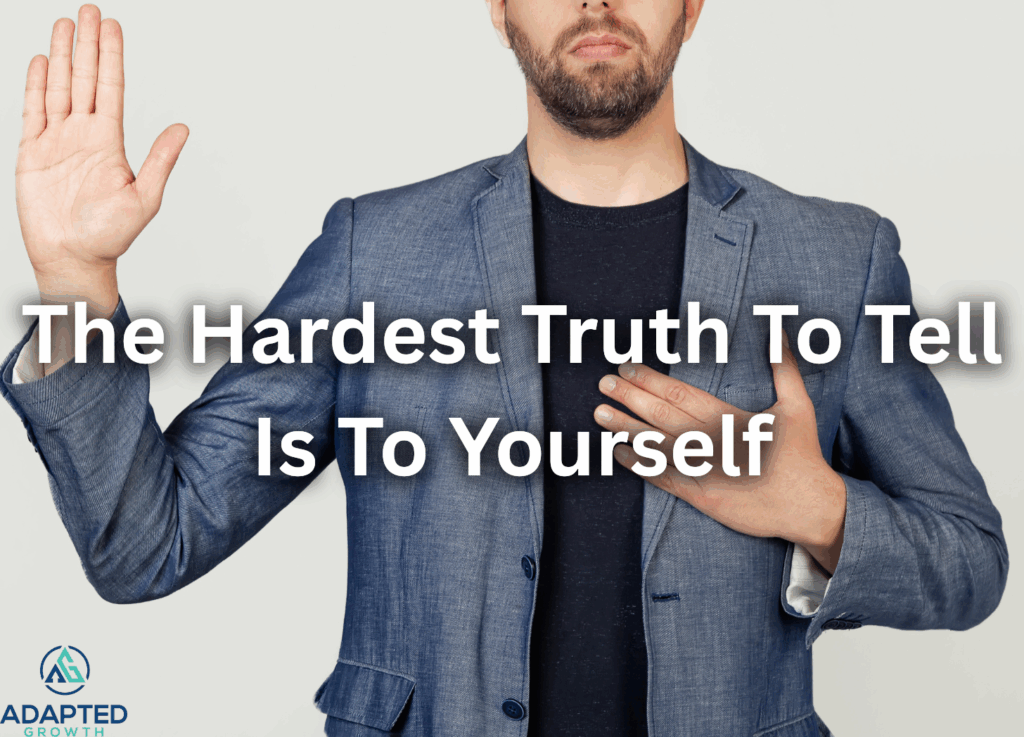No matter how strong your founder mindset is or how passionate you are about your business, there are probably unintentional avoidances and lies holding you back. As humans, one of our biggest downfalls is that we all lie. Each and every one of us. No matter how much you might think you never lie, that in itself is a lie.
Even when we are just softening a blow or not providing an honest and potentially hurtful opinion, these are still variations of lies.
On top of that, and probably the most frequent, is how often we lie to ourselves.
“I’ll start going to the gym next Monday.”
“I won’t drink any more sodas for the rest of the week.”
“No more social media for the day; it’s time to focus.”
We tend to hold our future selves to a higher standard than we are right now. No matter how realistic you may be, almost everybody thinks they will do more and do better tomorrow.
And that’s a good thing because it keeps us going and reaching.
However, it can also make the fall a lot harder when you use optimism to hide the truth in sales, especially as a founder.
Hiding From Metrics
In sales, your CRM is both your best friend and your biggest enemy.
It helps you stay on top of things, nurture your pipeline, and make sure your clients get the user experience they expect.
However, it also points a giant finger at what you’re not doing well. Whether it’s not making enough calls, dropping the ball on follow-ups, or failing to close a certain percentage of deals, it doesn’t let you hide.
Therefore, a lot of salespeople hate it, some even kind of fear it.
Working within a company provides a safety net. If you’re not doing what you need to do, you might receive extra support, more training, etc. Worst-case scenario, they let you go, and you have to find a new job.
Founders don’t have that net. If they don’t do the things they need to do, they lose everything.
Obviously, sales is a fairly high-stakes role, but founders have to embrace that role and sales mindset, and then some. So, when the safety net is gone, you’d better be on.
That means facing the metrics that scare you and not lying to yourself about where you stand. When you can do that, a sales mindset will evolve into an even more well-rounded founder mindset.

Where the Founder Mindset Should Start
A longtime friend of mine recently reached out and told me he decided it was time to go out on his own. He comes from sales, and with the 20+ years I’ve known him, I believe he can do it — especially since he already knows there are things he doesn’t know. That’s the best place to start when doing something big and new.
We were chatting about some of his concerns and questions, and then this happened:

I know what you’re thinking: “Woof, that’s a lot!” Fortunately, he knows me well, and that was the kind of response (I hope) he expected.
After answering the phone, the very first thing he asked was, “Where am I going to lie to myself?”
The giant sigh of relief I expelled upon hearing that question… I knew he would be just fine.
This is the point I try to help all my coaching clients reach: facing their challenges, weaknesses, missteps, and so on, before they have to be pointed out to them.
And it’s the question that every founder needs to stop and ask themselves and, if they have one, their coach/consultant. Especially founders who:
- Have a new idea they haven’t acted on yet
- Are in motion and moving fast trying to get things together.
- Aren’t making headway and don’t know why.
The thing is, there are so many ways a founder can hide and lie to themselves that it’s impossible to highlight them all. But the biggest ones include having a market-ready product, having enough financial support and backing to keep you up and running, and knowing how to sell it (or thinking you won’t need to).
These are also the biggest lies that quickly ruin a potentially great startup.
So, how do you avoid it?
Facing the Truth and Strengthening Your Founder Mindset
There are three huge ways you can keep yourself honest and accountable for where you are and where you’re going. Two of them are fairly straightforward and quick to adopt. The third is definitely the long game.
And, for the record, even when you are 100% honest with yourself and aware of the potential pitfalls, failure can still happen because, frankly, sometimes things just don’t go as planned. But doing these activities will prevent most of the preventable.
1. Track and Plan Everything Possible
First, set your goals. If you don’t know how, remember the SMART method and go from there.
Then, plan how you will get to those goals. Whether you journal, make spreadsheets, flowchart like a machine, or ‘beautiful mind’ a whiteboard, find a planning and goal-setting system that you can keep up with. (God, how I love my whiteboard!)
Start from where you are now, and then, step-by-step, figure out how to get to where you want to be. Most importantly, uncover the activities and smaller goals you’ll need to achieve in order to reach the big one.
Once the activities are figured out, put them into some kind of system (probably a CRM) and track them. Track their progress, completion, struggles, and outcomes.
It’s important to remember that this will be a living system, meaning it will change and shift as you learn more and grow.
The more you can plan and track, the fewer places you’ll have to hide and fall.

2. Find an Accountability Partner
Let’s face it; when we only have ourselves to be honest with, it’s so much easier to just not be.
But lying to somebody else’s face…that’s not as easy for most of us. Hence, get an accountability partner. Hell, have several on hand.
If you’re in a domestic relationship, knowing you have to help pay the bills can be accountability enough. However, if said partner isn’t familiar with the high-stakes world of entrepreneurship, they may not know how to support you when you need it.
Having a fellow founder or business leader is often much more helpful, especially since accountability works best when it’s reciprocated.
Another option is, of course, to work with a consultant or coach. This choice isn’t always the easiest if you’re low on funds. But believe me when I tell you, nobody will keep you as consistently accountable as somebody who is paid to do it.
Furthermore, they have the knowledge, training, and experience to support you in other areas, helping you to reach your goals and strengthen your founder mindset in ways that your friends and partners probably can’t.
(For what it’s worth, I became a coach because of how much my coaches helped me throughout my sales career. And the support and advice I received from them over the years gave me a monumental leg up when I went out on my own.)
That said, if a paid consultant isn’t in your budget right now, partner with somebody. Having another person to bounce ideas off of, listen to your struggles, and hold you accountable for doing the things you need to do can make an enormous difference.
3. Philosophy and Founder Mindset — The Long Game
Slowing down and questioning yourself doesn’t come naturally to everybody. Actually, scratch that. It doesn’t come naturally to 99% of the population.
Fortunately, it CAN be learned and practiced.
You will expand your abilities to do more, think more critically, and avoid both lying to yourself and the mistakes that occur from those lies when you take time to ask yourself questions like:
- Am I focused on what I can control?
- Have I weighed all the options and tradeoffs?
- Have I planned for potential failures, and will I know the warning signs before they happen?
- What don’t I know, and how will it impact things?
- MOST IMPORTANTLY: Where might I potentially lie to myself?
If you’re already a more introspective, philosophical person by nature, then maybe this won’t be that hard.
But if you’re like most founders — raring to go and excited for the future — finding time just to cogitate like this won’t be easy. It will keep you more honest and aware, though.
If you’re interested, read about Stoicism and the Socratic Method. Ryan Holiday’s “The Daily Stoic” and “The Stoicism Workbook” are perfect to start with.
You don’t have to be a philosopher to take your time and think through potential issues. If you’re intentional about goal-setting, planning, and tracking, the questions will naturally arise over time — as long as you keep looking for them.

You Owe It To Yourself
At the heart of the founder mindset is the ability to face yourself honestly, to separate optimism from illusion. The drive that makes you start a company is the same force that can blind you to the reality of what it takes to sustain it. You’ll tell yourself stories to stay in motion, to make the grind feel noble, to avoid the discomfort of what’s not working.
But real progress starts when you can sit with the truth, not the filtered version you tell investors, employees, or even your closest friends, but the one you whisper to yourself when the day ends. That truth is where growth begins.
Being honest with yourself doesn’t mean being cruel. It means being clear. It means choosing awareness over avoidance, even when it hurts your ego. When you practice that kind of honesty — when you stop lying to yourself about what’s hard, what’s missing, and what’s yours to fix — you give yourself a chance to build something real.
Because the hardest truth to tell is the one that sets you free.
If you need help finding the gaps and easy places to hide for your growing business, let’s talk.


